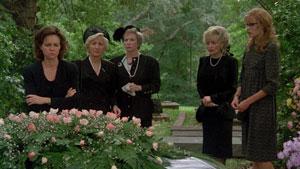 My first clue that Southern funeral customs differ from those elsewhere came years ago when someone near and dear — I no longer remember who — left us. Family and friends gathered. Casseroles, cakes, fried chicken and deviled eggs, all on dishes with the owners’s names written in Sharpie ink and taped to the bottom, arrived by the dozen, and everyone went for his or her adult beverage of choice.
My first clue that Southern funeral customs differ from those elsewhere came years ago when someone near and dear — I no longer remember who — left us. Family and friends gathered. Casseroles, cakes, fried chicken and deviled eggs, all on dishes with the owners’s names written in Sharpie ink and taped to the bottom, arrived by the dozen, and everyone went for his or her adult beverage of choice.
Fred, the then-new hubby of a close cousin and a native Belgian, was scandalized. Why, he wailed, were we all camped out at the home of the deceased and chatting with his family? “These people need their privacy to grieve!” he cried.
Fred’s opinion notwithstanding, Tar Heels born and bred and Southerners from elsewhere say farewell to our loved ones and the ones we did not love at all just like Frank Sinatra — we do it our way. We can have as many weddings as we want, but we all get only one funeral and associated gatherings, and some of them are truly memorable.
Let’s continue with food, which begins arriving the moment word gets out about a family’s loss. So important is this custom that I have friends who keep casseroles frozen for this very purpose. My personal favorite in this area is a turkey breast, which can be yanked from the freezer in short order and roasted without many other ingredients. Thawing takes time, though, so I am rarely the first person at the door.
The bible of funeral food is the hilarious “Being Dead is No Excuse: The Official Southern Ladies Guide to Hosting the Perfect Funeral.” This is a laughout-loud account by Gayden Metcalfe of our funeral customs complete with analysis of who brings the best funeral food — Baptists, Methodists or Episcopalians. It offers recipes for funeral staples, including tomato aspic, coconut cake and pickled shrimp. The best friends of the lady of the house run the funeral kitchen, keep lists of who brought what on which dish and make sure “the family” is sated not only during their immediate bereavement but for weeks afterward.
Once it is clear that no one, not counting the deceased, is going to starve, it’s time to plan the funeral. Religious traditions vary, but there are a few general rules. In direct contrast to Fred’s call for privacy, in the South it is generally OK to attend funerals of people you might have known only slightly. After all, families appreciate a good crowd and consider it a mark of the dearly departed’s standing in the community. Southern decorum seems to demand a euphemism — passed away — for what has occurred, although I prefer the factual “died.”
Thoughtful Southerners plan our own funerals, sparing our loved ones the ordeal of figuring out what we would have liked. This includes who might speak, scriptures to be read, hymns to be sung, what flowers in what vases, who sits where, limousines or not and other matters deemed critical to a proper send-off. I have even heard of one woman who froze casseroles for her own funeral, apparently believing that no one could make them better than she could.
When it’s time for the service, other motorists will pull off the road in deference to the deceased and the grieving family as the funeral cavalcade passes, a custom people from elsewhere consider a traffic hazard. Sometimes friends and family members share memories during the service, but this custom makes me nervous because sometimes they share too much — the good, the bad and the truly ugly. In my view, such memories are best talked about at home with a beverage and a plate of fried chicken. A great deal of talking also risks cringe-worthy comments like “Pearl was a real pearl,” which I heard at a Charlotte funeral years ago and which convinced me that less is more when it comes to speaking publicly about the deceased.
Then there are the flowers. Some families like them big and bold, some more restrained, but whatever they are, they should be real, not artificial and certainly not plastic. Also on my no-no list are “theme” funerals, which I learned about from Southern Living magazine. It seems that some families have taken to memorializing the departed by highlighting his or her favorite pastime — camouflage caskets for hunters, fishermen buried in their boats, sports fans memorialized by team colors. Yikes!
Over the nearly half-century of his marriage, Fred has come around to the Southern way of saying goodbye, a sort of “bon voyage for a life well-lived” — or not. I think he agrees that funerals bring out the best in Southerners, our reverence for family and friends and a deeply felt caring for the needs of others. The time for grieving in private will come to all of us, but in the immediate aftermath of a death there is nothing like the distraction of the loving comfort of those who know us well. Coming next week: Southern Obituaries Greatest Hits.